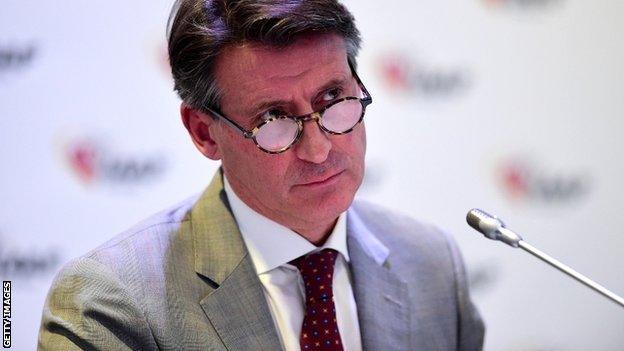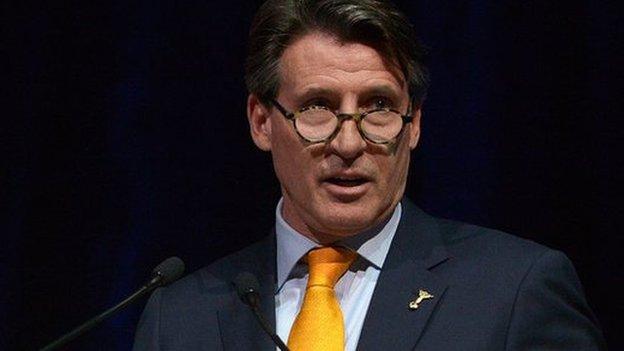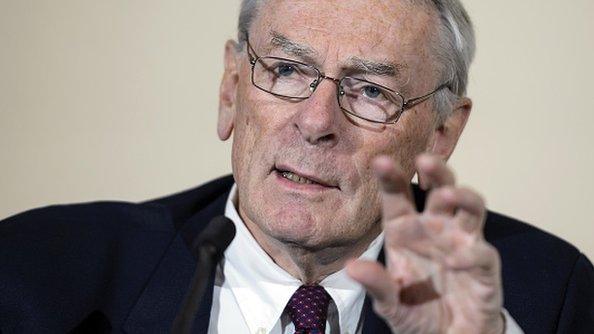Lord Coe: IAAF vice-president defends role at world body
- Published

Lord Coe was appointed IAAF president in August
Lord Coe has defended his record at the IAAF but says there have been failures in detecting blood doping during his time at athletics' governing body.
Coe was vice-president in 2007 before becoming president in August, with The Sunday Times, external claiming widespread doping occurred between 2001 and 2012.
Coe told a select committee on Wednesday that as vice-president he had not been oblivious to doping claims.
"Were all our systems good enough - I doubt it," he said.
Coe quizzed over his IAAF record
Coe said that much of his time as vice-president had been spent delivering the London 2012 Olympics.
"I was aware we had a problem, but the specific numbers, I did not," he said.
"Every six months the anti-doping unit would deliver its progress - that was the extent of information we were given. Was I aware the problem was escalating? Yes."
Accusations about doping in athletics in recent months have included an independent World Anti-Doping Agency (Wada) report that alleged "state-sponsored doping" in Russia.
More on Coe's IAAF presidency |
|---|
The 'declaration of war' comments
Two-time Olympic 1500m champion Coe had initially been called before the Commons culture, media and sport select committee to explain earlier criticism of The Sunday Times investigation, which he called "a declaration of war on my sport".
The newspaper investigation stated that a third of medals in endurance events at the Olympics and World Championships over 11 years were won by athletes who had recorded suspicious tests, but Coe said his comments were not an attack on the media.
"My observation at the time was that it was reckless use of data, to actually imperil the reputation of clean athletes and [Britain's marathon world record holder] Paula Radcliffe's treatment was a clear example of that," he added.
"I stick by the sentiments. I probably might have chosen different language. It probably expressed my frustration and yes, anger at the time.
"I'm sorry this has mutated into an attack on the media. I will die in a ditch for the right for media groups to question my motives, to call to task the sport I'm currently head of."
'Regaining trust may see out my mandate' - what else did Coe say?
During more than two-and-a-half hours in front of MPs, Coe addressed a number of other questions about doping and the IAAF.
Asked what he has done since becoming International Association of Athletics Federations president and if he thinks he is the right man:
"I have the experience to do that and I have the support of the sport. Have there been failures? Yes. Will I fix them? Yes.
"Returning trust will be a longer journey, and probably see out my mandate."
Asked if he thinks the blood data of all athletes should be published to improve transparency:
"No. The way that some of those profiles have been used has damaged the reputation of clean athletes. The issue for us is clear - we need systems in place that can follow up on suspicions. We do - we've just taken medals away from some athletes from the 2005 World Championships."
Asked if there is an acceptance within the IAAF that doping is acceptable:
"If I go back to the immediate challenge we have, there is Russia's ban and allegations made about some people in the IAAF. If you say the IAAF has acceptance that doping is acceptable, I don't accept that."
Asked, following recent allegations regarding doping in Kenyan athletics, whether he has suspicions about other federations:
"Dick Pound, the chair of independent commission, has made it clear this is not simply about Russia, and not simply about athletics. People tend to forget this is not simply about athletics."
Is there more to come from the second part of the Wada report?
"I genuinely don't know the answer to that. There's a lot of speculation around it, but we have no prior knowledge of what is in the report. If it shows there is systematic failure, we will address it."
Asked about ending his ambassadorial role with Nike following conflict of interest claims over the 2021 World Championships going to Eugene, Oregon, where the company is based:
"This had become a monstrous distraction. Reality and perception had become horribly entangled and I didn't want anything to distract from changes I have implemented. In hindsight, if I thought the noise would have escalated would I have got rid of it beforehand, yes I would have."
Asked if he regrets taking the role as IAAF president?
"Not for one moment. The sport has been very good to me. I started life as an athlete. Athletics will always define me."
- Published1 December 2015

- Published12 November 2015
- Published25 November 2015
